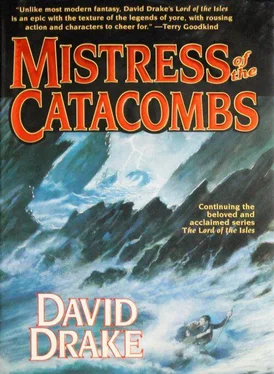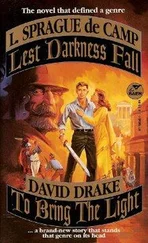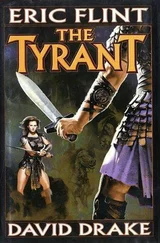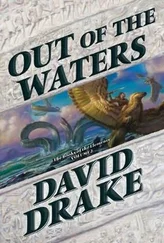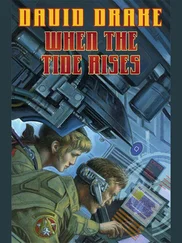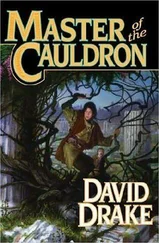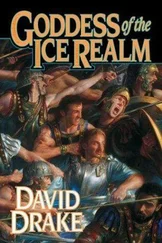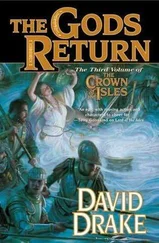Tilphosa lifted her chin in agreement. “I don’t want anything from this island,” she said. “It’s a place of ill omen.”
“You don’t have to tell me about ill omen,” Mounix growled. He relaxed; Cashel let go of his tunic. “I saw what happened to your maid, didn’t I?”
He’d sheathed his curved sword because he needed both hands for the climb; he drew it again now. Cashel had met swordsmen. Mounix wasn’t one.
Costas joined them, saying nothing. He nocked one of his three arrows in the waxed string of his bow.
Metra sat on the nose of the outcrop where only lichen grew. The crumpled golden framework lay before and beside her. Instead of scraping figures onto the rock, she took out a square of white silk embroidered with symbols in red. She began to murmur an incantation, her ruddy copper athame dipping and rising above each syllable in turn.
Mounix grimaced and turned his back. “Sister take all this!” he muttered. “But if she can send whatever it was that ate the girl back to the Underworld, she can talk to a thousand demons for all I care.”
“When we get off this island,” Cashel said, “it won’t matter what it is that lives here. The boat looked like it came through the storm pretty well. Can’t we leave in it?”
“The dinghy, you mean?” Mounix said with a sneer of disgust. “Not like it is now, not if we want to get everybody aboard and take food and water for them. I guess that doesn’t matter to you, since you’re not with us, right?”
“We’re all strangers here,” said Cashel. “I figured we’d stick together for the time being.”
“Master Cashel will accompany me, captain,” Tilphosa said coldly. “Will you be building another ship, then?”
Light—red wizardlight—shimmered in the thicket where the framework lay. Metra raised her voice enough that the others could hear, “ …iorbeth neuthi… ”
When Mounix heard the words of power, he snarled, “Sister take her!” under his breath. He was one of the people who lost all their courage in the face of wizardry; though it didn’t seem to Cashel that the captain was particularly brave on a good day.
Costas didn’t seem to be bothered. “It’s easier than that,” he said. “We’ll just build up the gunnels of the dinghy so that we can load her deeper. We’ve got enough timbers salvaged from the wreck we can do that easy. Right, captain?”
“Yeah, we can do that,” Mounix said. “I’ve got the crew working on it now. That’s why I left Hook behind, to get going on the job. He’s the ship’s carpenter.”
The air in front of Metra squealed; the sound didn’t come from the wizard’s throat. Red light coalesced into something almost solid, the way butter forms in a churn.
Metra lowered the athame and slumped backward. She’d have fallen if Cashel hadn’t reached out to support her; he carried the wizard back a double pace.
She’d managed to hold on to her athame, but Cashel bent to pick up the embroidered silk with two fingers of the hand holding his staff. He didn’t much like Metra, but he’d so often helped Tenoctris that caring for a wizard exhausted from working her art had become second nature to him.
The rosy light expanded. Cashel couldn’t judge its size; without any seeming change, what had been a globe became instead a hole into another place. A spindle-shaped object of ivory and mother-of-pearl floated on its side over a forest of giant horsetails and trees with limbs like green whips.
“Is that a ship?” Costas said, squinting at the vision. “What kind of a ship is that? It’s flying!”
Captain Mounix glanced over his shoulder, then turned his head again with a look of thunderous misery. He sliced at a shrub with his sword. His blade cut into the wood, then sprang back.
“The Third Race was able to fly, according to Asterican scriptures,” Tilphosa said quietly. She was composed: frightened but facing her fear.
Cashel didn’t know who the Astericans were, let alone the Third Race. “Did they live around here?” he asked. Though he didn’t really know where “here” was.
Metra had regained enough control of her limbs to stand without Cashel’s help. She slid the athame under her sash. Cashel offered the silken document. She took it from him without thanks and folded the square into a tight bundle before replacing it in her sleeve.
Tilphosa looked at Cashel. “The world was very different then,” she said. “According to scripture. The Isles didn’t exist.”
Cashel frowned, trying to imagine how the Isles could not exist. It was like hearing that there was no sky.
“The Third Race weren’t men,” Tilphosa added. “According to scripture.”
The vessel’s hull began to glow with soft pastels that weren’t just the sheen of the mother-of-pearl. The ship rose straight up, then sailed toward the horizon at gathering speed. Though the evening air was warm, Cashel felt a chill along his spine.
The vision ended—or the window closed?—soundlessly. In its place was the brushwood thicket where incorruptible metal sparkled.
“How old is the boat you just showed us, Mistress Metra?” Cashel asked. He squatted down for a closer look at part of the framework sticking clear of the undergrowth. He didn’t touch it.
“You couldn’t understand,” Metra said with a shrug. Turning to Mounix, she said, “Captain, you can do what you please now. I have no further use for this trash.”
Tilphosa gave the priestess an appraising look; while not actively hostile, there was no affection in it either. To Cashel she said, “It would be very old, Cashel. If it was from the Third Race, it was older than we have words to describe. A year wasn’t the same thing when the Third Race lived.”
Mounix and his henchman were listening to the girl also. The captain spat, then said, “Let’s get back to the shore. It’s getting late, and I don’t want to be caught around this thing in the dark.”
“But how about the gold, captain?” Costas demanded. He rotated his arrow and held it against the bowstaff instead of ready for use. “Aren’t we going to take it with us? Some, I mean.”
Mounix started down the slope. “You do what you please, Costas,” he said. “I don’t want any part of that thing.”
“I’ll go in front of you like before,” Cashel told the girl. Metra started to speak, then decided not to. Cashel guessed the wizard was going to ask him to help her as well, but she figured he’d give her a short answer because of the way she’d been acting toward him.
Cashel smiled faintly. Sure, he’d help Metra the same as he’d help most anybody. He couldn’t change how other people were, but he didn’t let them change how he behaved either.
Mounix was moving faster than Cashel cared to do on this slope. There was some reason—it would be dark soon; dawn and nightfall were more sudden in this place than Cashel was used to. Cashel guessed the captain was afraid of more than darkness, though.
On the outcrop, metal chimed as Costas tried to break off pieces of the gold. He’d have his work cut out for him: the tubes were hard enough that iron didn’t scratch them and so tough that mostly they’d bent instead of breaking when the boat smashed into the rocks.
“Metra?” Tilphosa said. She spoke without turning her head but in a clear tone so that the woman following could hear. “What did your dreams tell you? Does the wreckage up there have anything to do with why we wrecked on this island?”
Cashel caught several geranium stems in his left hand. “Watch this,” he warned those behind him. “The clay’s slick here.”
The soil anchored roots solidly, though. Even Cashel’s weight with Tilphosa’s added hadn’t threatened to pull out any of the bushes he’d used for support on the way up.
Читать дальше
